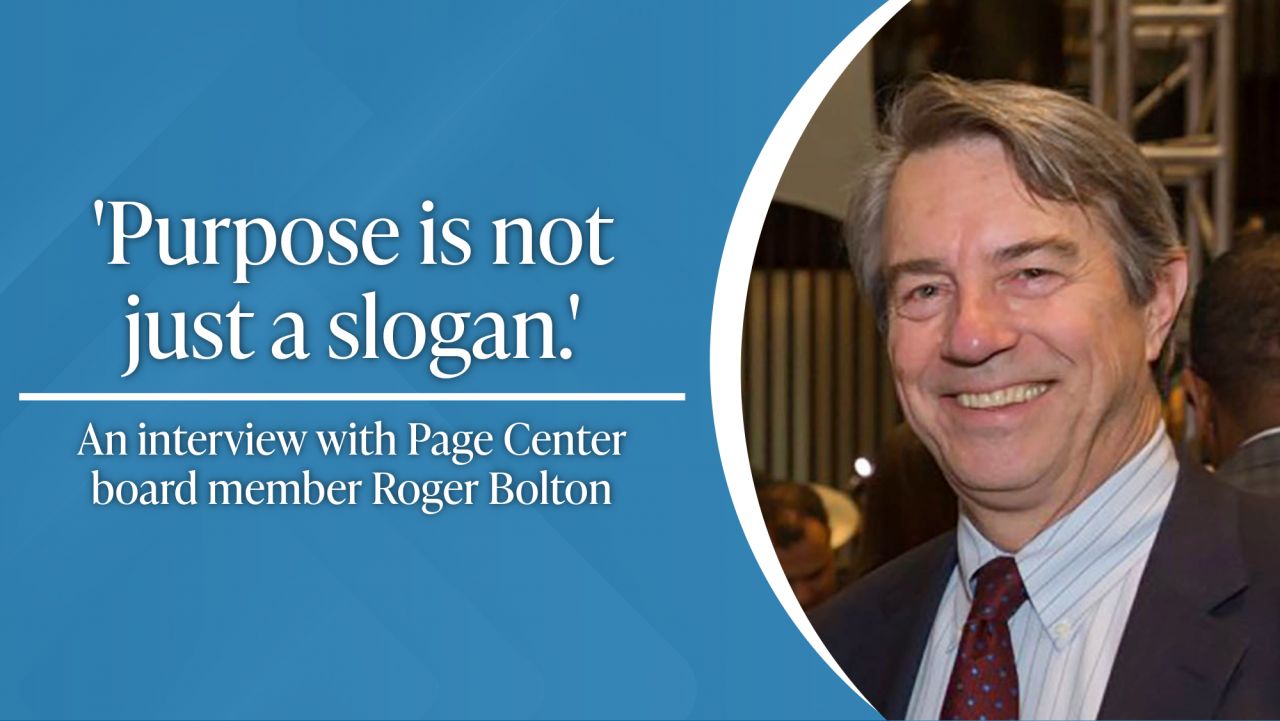January 29, 2025
Page Center board member Roger Bolton shares why purpose goes much deeper than PR

PRWeek published an article on how the word “purpose” in public relations has changed due to hesitation in employing DEI and ESG efforts out of fear of being seen as inauthentic or unpopular. After reading that article, I wanted to see what recently retired Page Society CEO and President and current Page Center advisory board member Roger Bolton had to say about this shift the industry is facing.
Having served as assistant secretary of the treasury for public affairs under President George H.W. Bush among other roles in the White House, IBM’s director of corporate media relations and director of communications for the IBM server and software groups, and senior vice president of communications at Aetna, I knew Roger's expertise in this area was vast and transcended industry lines and media landscapes.
I wanted to know how he defined purpose in public relations, but his response was eye-opening.
“Once we think about why we exist and what value we create, we start thinking about how we can carry out this purpose."
Roger Bolton Page Center board member
“I think you have to take the ‘in PR’ part out of your question,” he said. “I would first think about the organization's purpose for existence. Why do we exist and what value do we create? The organization needs to answer those questions first.”
I know what you’re thinking, most organizations would have the answer “to make money or meet our bottom line.” Roger acknowledges this.
“Sure, some organizations would say to make as much money as possible, but those aren’t the organizations you want to be a part of,” he said. “You want to engage with organizations that say we see a need in society for our products and services. We want to provide them in a way that helps customers and creates value for the people who work for us. We want to provide value for our shareholders who have invested in us, to give us the opportunity to create this value, so that they get financial value as well.”
Roger could not talk about “purpose” without talking about DEI and ESG efforts companies make to support their purpose.
“Once we think about why we exist and what value we create, we start thinking about how we can carry out this purpose,” he said. “What environmental impacts does our organization have? How much energy are we using? Or who is a part of our organization? What voices are being amplified?”
I thought this was an interesting point; purpose cannot be untangled from an organization’s value sets. It is interwoven in their practices and efforts, no matter what acronym is used to describe it. Roger added, “It's really important to make commitments and change policies and practices to be able to fulfill those commitments. It is also important that you report on those and that you hold yourself accountable when you fall short and indicate how you're going to evolve to change your objectives or change the outcomes.”
Roger doesn’t just talk about getting organizations to define their purpose, he has walked the walk and helped real ones do it.
“I worked at a company where I tried really hard to get them to actually identify their purpose. I wanted there to be a shift from ‘We provide these services and charge this much to do it’ to ‘We want our customers to be informed enough to engage with our services and feel good about what they are paying for.’ Purpose is not just a slogan you slap onto your marketing materials. It is much deeper than that.”
One of the Page Principles is “Listen to your Stakeholders,” which I thought was important to bring up in this conversation. Roger shared stories about how sometimes people in positions of power can be overcome by pressure/feedback from customers and stakeholders and just want to ignore them, but he talked about how in his role as a communicator, it was important to listen to all those voices and create messaging that catered to them.
He said, “This also goes with the second Page Principle ‘Prove it with Action.’ If you say you care about your customers or stakeholders, you have to make changes to benefit them and represent them.”
In a world where purpose can be conflated and seen as taboo, it is important to get back to the basics. As Roger mentioned, purpose is all about why a company exists, how it brings value to the world, and how that purpose can be achieved in the best way possible.
Loredonna Fiore is a Ph.D. student in the Donald P. Bellisario College of Communications at Penn State.
